《资源与环境经济学》经典文献
环境经济学经典文献导读
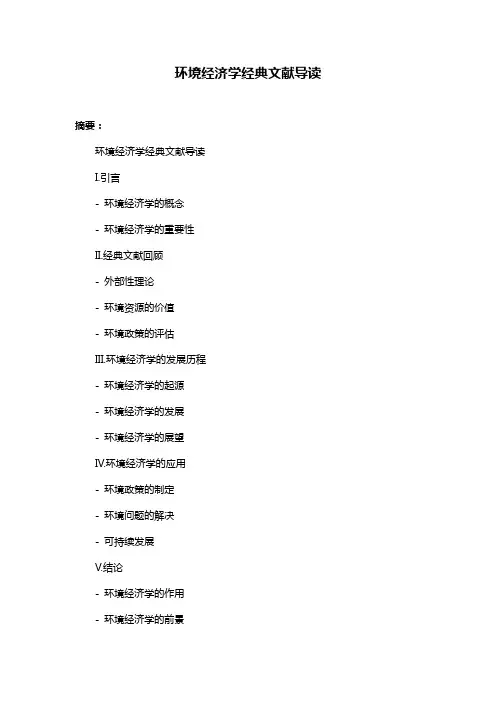
环境经济学经典文献导读摘要:环境经济学经典文献导读I.引言- 环境经济学的概念- 环境经济学的重要性II.经典文献回顾- 外部性理论- 环境资源的价值- 环境政策的评估III.环境经济学的发展历程- 环境经济学的起源- 环境经济学的发展- 环境经济学的展望IV.环境经济学的应用- 环境政策的制定- 环境问题的解决- 可持续发展V.结论- 环境经济学的作用- 环境经济学的前景正文:环境经济学经典文献导读I.引言环境经济学是一门研究环境与经济相互作用的学科,它涉及环境资源的使用、环境的保护以及可持续发展等问题。
环境经济学的研究不仅可以帮助我们更好地理解环境与经济之间的关系,而且可以为环境政策的制定提供理论依据。
本文将从环境经济学的经典文献出发,对环境经济学的发展历程、理论框架以及应用进行综述。
II.经典文献回顾2.1 外部性理论外部性是指一种经济行为对其他人或社会产生的影响。
外部性理论是环境经济学的基础理论之一,它告诉我们环境问题的产生往往与经济行为的外部性有关。
其中,庇古(Pigou) 的外部性理论是最具代表性的。
庇古认为,外部性会导致社会成本的存在,而社会成本的存在会导致资源配置失当。
因此,政府需要对具有外部性的经济行为进行干预,以实现资源的有效配置。
2.2 环境资源的价值环境资源的价值是环境经济学研究的重要内容之一。
瓦尔拉斯(Vilfredo Pareto) 和科斯(Ronald Coase) 分别从生产和消费的角度对环境资源的价值进行了研究。
瓦尔拉斯提出了环境资源的“边际效用”概念,认为环境资源的价值取决于其对消费者的边际效用。
科斯则从产权的角度出发,认为环境资源的价值取决于产权的分配方式。
2.3 环境政策的评估环境政策的评估是环境经济学研究的重要应用之一。
威克斯(W.K.Vickrey) 和尼斯(R.H.Nisbet) 等学者对环境政策的评估方法进行了研究。
他们认为,环境政策的评估应该从成本和效益两个方面进行考虑,以实现环境和经济之间的平衡。
资源与环境经济学 第2章 资源环境与可持续发展 【佳构】
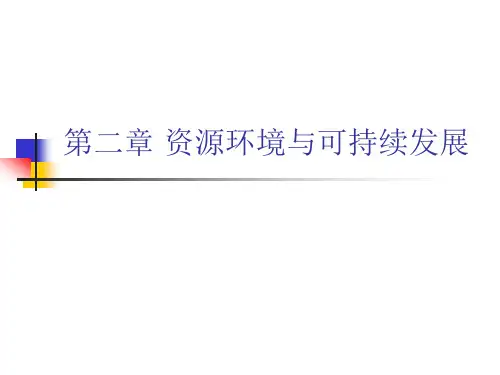
4.可持续发展的概念与内涵
➢可持续发展的由来
概述 可持续发展的概念由来已久,但可持续发展的概念一度
是政治辩论的主题
可持续发展是在70年代人们迎战“增长的极限”论战时 最受欢迎的论点
可持续发展一度成为政治目标
4.可持续发展的概念与内涵
➢ 可持续发展的由来
从经济增长到经济发展 经济增长:指一定时期内人均国民生产总值实际水平的 提高,也指每个人或实际消费水平的增加
➢ 可持续发展的由来 从经济增长到经济发展
经济发展不仅包含了经济增长,而且还涉 及到其他社会福利的改善或社会进步
经济发展意识到了经济目标与社会目标的 统一,但却忽视了资源与环境对经济发展 的作用
4.可持续发展的概念与内涵
➢ 可持续发展的由来 从经济增长到经济发展 从经济发展到可持续发展
从一般意义上讲:可持续发展的理念宣称,环境 质量以及自然环境所提供的普遍服务的功能比起 过去在发展规划中和经济管理中所假定要重要的 多。
在发展中国家经常出现经济发展与环境退 化之间的贫困陷阱
发展中国家人们也因此意识到保护环境的 重要性:可以避免贫困陷阱的出现
全球化带来的经济增长和发展
经济增长,投资,发展
开放贸易 国内对外国 投资的优惠政策
工作岗位,收入增加 生活水平提高
思想的传播 互联网,人 技术的快速转让
全球化带来的环境与社会影响
主要参考书目
Kula, E., (1994), “Economics of Natural Resources, the Environment and Policies”, Chapman and Hall, London, UK.
Hartwick, M., J., and Olewiler, N., (1997 ), “The Economics of Natural Resource Use”, Addison-Wesley Educational Publishers, U.S.
《资源与环境经济学》经典文献
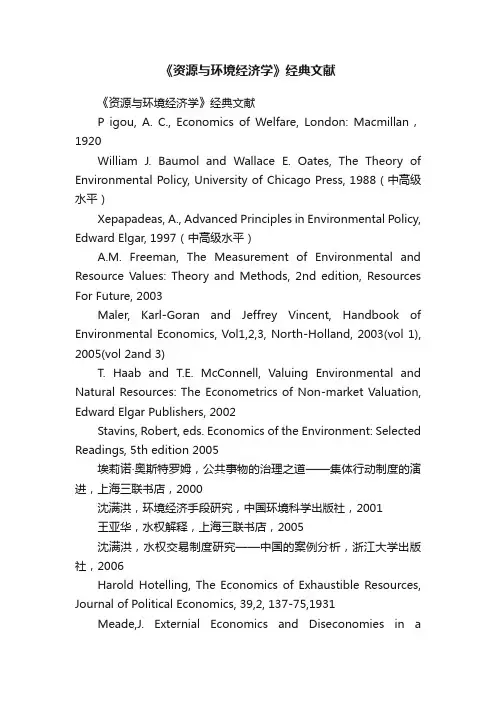
《资源与环境经济学》经典文献《资源与环境经济学》经典文献P igou, A. C., Economics of Welfare, London: Macmillan,1920William J. Baumol and Wallace E. Oates, The Theory of Environmental Policy, University of Chicago Press, 1988(中高级水平)Xepapadeas, A., Advanced Principles in Environmental Policy, Edward Elgar, 1997(中高级水平)A.M. Freeman, The Measurement of Environmental and Resource Values: Theory and Methods, 2nd edition, Resources For Future, 2003Maler, Karl-Goran and Jeffrey Vincent, Handbook of Environmental Economics, Vol1,2,3, North-Holland, 2003(vol 1), 2005(vol 2and 3)T. Haab and T.E. McConnell, Valuing Environmental and Natural Resources: The Econometrics of Non-market Valuation, Edward Elgar Publishers, 2002Stavins, Robert, eds. Economics of the Environment: Selected Readings, 5th edition 2005埃莉诺·奥斯特罗姆,公共事物的治理之道——集体行动制度的演进,上海三联书店,2000沈满洪,环境经济手段研究,中国环境科学出版社,2001王亚华,水权解释,上海三联书店,2005沈满洪,水权交易制度研究——中国的案例分析,浙江大学出版社,2006Harold Hotelling, The Economics of Exhaustible Resources, Journal of Political Economics, 39,2, 137-75,1931Meade,J. Externial Economics and Diseconomies in aCompetitive Situation,Economic Journal, Vol.62,PP54-67, 1952 Coase, Ronald, The Problem of Social Cost, Journal of Law and Economics, 3, 1-44, 1960Buchanan, J. and W. Stubblebine, Externality, Economica, 371-384, 1962 Baumol, W.J., On Taxation and the Control of Externalities, America Economic Review, PP.307-321, 1972 Demsetz,H., Toward a Theory of Property Rights, American Economic Review,Vol.57, PP.347-359,May 1967Garrett Hardin,The Tragedy of the Commons, Science, Vol. 162, PP1243-1248,Dec.13, 1968Steven Kelman, "Cost Benefit Analysis: An Ethical Critique" (1981)James V. Delong, Robert M. Solow, Gereard Butters, John Calfee, and Pauline Ippolito, "Defending Cost-Benefit Analysis: Replies to Steven Kelman" (1981)Robert W. Haln, Economics Prescriptions for Environmental Problems: How the Patient Followed the Doctor’s Orders, Journal of Economic Perspectives, 3(2):95-114, 1989Tom Tietenberg, "Economic Instruments for Environmental Regulation" (1990) William D. Nordhaus, To Slow or Not Slow: The Economics of the Greenhouse Effect, Economic Journal, 101, 920-37, 1991Robert M. Solow, "Sustainability: An Economist’s Perspective" (1992)Maureen L. Croper and Wallace E. Oates, Environmental Economics: A Survey, Journal of Economic Literature, 30:675-740, 1992V. Kerry Smith, Nonmarket Valuation of Environmental Resources: An Interpretive Appraisal, Land Economics, 69(1):1-26,1993William D. Nordhaus, "Reflections on the Economics of Climate Change" (1993) Paul R. Portney, "The Contingent Valuation Debate: Why Economists Should Care" (1994) W. Michael Hanemann "Valuing the Environment through Contingent Valuation" (1994)Peter A. Diamond and Jerry A. Hausman, "Contingent Valuation: Is Some Number Better than No Number?" (1994) Adam B. Jaffe, Steven R. Peterson, Paul R. Portney, and Robert N. Stavins, "Environmental Regulation and the Competitiveness of U.S. Manufacturing: What Does the Evidence Tells Us?" (1995) Michael E. Porter and Claas van der Linde, "T oward a New Conception of the Environment-Competitiveness Relationship" (1995)Karen Palmer, Wallace E. Oates, and Paul R. Portney. "Tightening Environmental Standards: The Benefit-Cost or the No-Cost Paradigm?" (1995)W. Michael Hanemann, Contingent Valuation and Economics, Environmental Valuation: New Perspectives, 79-117, 1995 W. Kip Viscusi, Regulating the Regulators, University of Chicago Law Review, 63:1423-1461, 1996Kenneth J. Arrow, Maureen Cropper, George C. Eads, Robert W. Hahn, Lester B. Lave, Roger G. Noll, Paul R. Portney, Milton Russell, Richard Schmalensee, V. Kerry Smith, and Robert N. Stavins, "Is There a Role for Benefit-Cost Analysis in Environmental, Health, and Safety Regulation?" (1996) R. Costanza, R. d'Arge, R. de Groot, S. Farber, M. Grasso, B. Hannon, S. Naeem, K. Limburg, J. Paruelo, R.V. O'Neill, R. Raskin, P. Sutton and M. van den Belt, The value of the world's ecosystem services and natural capital, Nature387, pp. 253–260, 1997Michael J. Sandel, "It’s Immoral to Buy the Right to Pollut e" 1997Thomas C. Schelling, "The Cost of Combating Global Warming" (1998)Henry D. Jacoby, Ronald Prinn, and Richard Schmalensee, "Kyoto’s Unfinished Business," Foreign Affairs 77, July/August, 1998: pp. 54-66.Gardner M. Brown and Jason F. Shogren, "Economics of the Endangered Species Act," Journal of Economic Perspectives 12 (1998): 3-20.Andrew Metrick and Martin L. Weitzman, "Conflicts and Choices in Biodiversity Preservation" (1998)Nathaniel O. Keohane, Richard L. Revesz, and Robert N. Stavins, "The Choice of Regulatory Instruments in Environmental Policy" (1998)Richard Schmalense, Pau L. Joskow, A. Denny Ellerman, Juan Pablo Montero and Elizabeth M. Bailey, An Interim Evaluation of Sulfur Dioxide Emissions Trading, Journal of Economic Perspectives, 12(3):53-68, 1998Robert N Stavins, What Can We Learn from the Grand Policy Experiment? Lessons from SO2 Allowance Trading, Journal of Economic Perspectives, 12(3):69-88, 1998 R. David Simpson, Economic Analysis and Ecosystems: Some Concepts and Issues, Ecological Applications, (2)342-349,1998Paul L. Joskow and Richard Schmalense, The Political Economy of Market-Based Environmental Policy: The U.S. Acid Rain Program, Journal of Law and Economics, 41:37-83, 1998 Jason F. Shogren, A Political Economy in an Ecological Web, Environmental and Resource Economics, 11(3-4):557-570, 1998 Robert W. Hahn, "The Impact of Economics on EnvironmentalPolicy," Journal of Environmental Economics and Management 39 (2000): 375-399.W. Kip Viscusi, "The Value of Life in Legal Contexts: Survey and Critique," American Law and Economics Review 2 (2000): 195-222.Warwick J. McKibbin, and Peter J. Wilcoxen, "The Role of Economics in Climate Change Policy," Journal of Economic Perspectives 16 (2002): 107-129.Lawrence H. Goulder and Robert N. Stavins, "An Eye on the Future," Nature 419 (2002): 673-74.A. Myrick Freeman, "Environmental Policy Since Earth Day I: What Have We Gained?" Journal of Economic Perspectives 16 (2002): 125-46.Susmita Dasgupta, Denoit Laplante, Hua Wang, and David Wheeler, "Confronting the Environmental Kuznets Curve," Journal of Economic Perspectives 16 (2002): 147-68.Scott Barrett, "Creating Incentives for International Cooperation: Strategic Choices," in I. Kaul, P. Conceiá“o, K. Le Goulven, and R. U. Mendoza (eds.), Providing Global Public Goods: Managing Globalization (New York: Oxford University Press, 2002, pp. 308-28).Richard T. Carson, Robert C. Mitchell, Michael Hanemann, Raymond J. Kopp, Stanley Presser, and Paul A. Ruud, "Contingent Valuation and Lost Passive Use: Damages from the Exxon Valdez Oil Spill," Environmental and Resource Economics 25 (2003): 257-86.Robert W. Hahn, Sheila M. Olmstead, and Robert N. Stavins, "Environmental Regulation in the 1990s: A Retrospective Analysis," Harvard Environmental Law Review 27 (2003): 377-415.Jeffrey A. Frankel, "The Environment and Globalization,"forthcoming in Globalization: What’s New, edited by Michael Weinstein (Council on Foreign Relations, 2004).。
资源与环境经济学论文
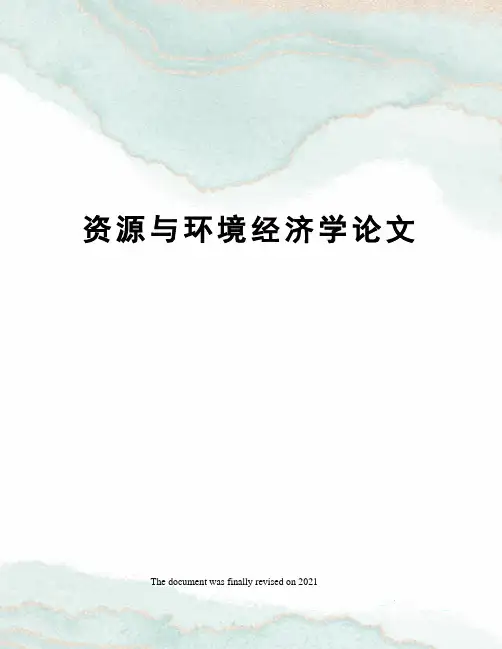
资源与环境经济学论文 The document was finally revised on 2021环境经济学论文班级:学号:11姓名:刘馨桐地表水利用的经济学分析水是生命之源,是农业之本,也是工业的血液。
人类的社会活动与生产,方方面面都离不开水,自古代以来,先人早就懂得修建水坝和渠道,疏水防旱,合理配置和使用水资源,使得社会得以在平稳中发展。
直至近代,由于工业的迅猛发展,湖泊,河流等地表水成为了工厂废水,废渣的汇,使得地表水的水质不断恶化,加之对地表水毫无节制的使用,使得水资源的布局发生结构性的改变,而导致许多地方开始缺水或者水质性缺水。
而在现代,在人们遭受到各种因“水”所蒙受的损伤和灾难之后,人们才开始意识到要对自己长期以来对环境的债务偿还。
如何在保持社会和地区的发展的同时,修复地表水长期以来所遭受的各种破坏,这涉及到水之源的有效配置和利用,关系到生活与生产的基本满足,生产力的再提高,和下一代可利用水状况以及水资源利用的可持续发展。
而合理利用和配置水资源,不仅要依靠工程水利,更多的我们要改变以往的观念,从本质出发,研究和规划资源水利,可持续发展水利。
地表水的利用规划当中比较突出的一点就是江河流域沿岸农业与工业用水的分段规划,对于小型流域,如地区河流的水资源的规划利用,考虑到不同产业所用水的水功能种类的要求不同,应尽量将生活集中用水取水口设在上游,而将污染水较严重的工、农业设在河流的中,下游。
要实现这样的产业分布,可以通过对土地利用的规划,来满足各类用水的需求。
但是,对于黄河、长江等大型流域,要通过土地规划来实现这样的分布,明显是不可能的,因为即使抛开现实来讲,这不仅需要大量的人力物力来设置管道系统,而且当各类用水发生变化时,要花更多的资源去改变管道系统来适应变化,这样边际成本明显增加,假设社会收益没有多大的变化,那么从经济角度来讲社会的单位用水所需耗能将会偏高,显然不能符合资源水利这一发展要求。
资源与环境经济学论文
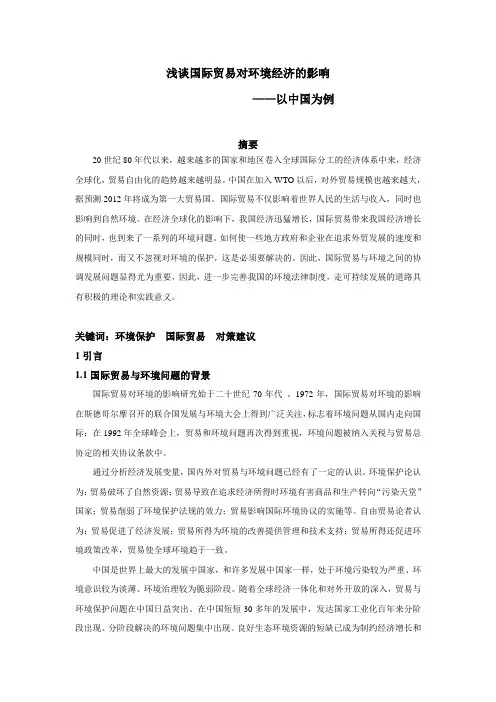
浅谈国际贸易对环境经济的影响——以中国为例摘要20世纪80年代以来,越来越多的国家和地区卷入全球国际分工的经济体系中来,经济全球化,贸易自由化的趋势越来越明显。
中国在加入WTO以后,对外贸易规模也越来越大,据预测2012年将成为第一大贸易国。
国际贸易不仅影响着世界人民的生活与收入,同时也影响到自然环境。
在经济全球化的影响下,我国经济迅猛增长,国际贸易带来我国经济增长的同时,也到来了一系列的环境问题。
如何使一些地方政府和企业在追求外贸发展的速度和规模同时,而又不忽视对环境的保护,这是必须要解决的。
因此,国际贸易与环境之间的协调发展问题显得尤为重要,因此,进一步完善我国的环境法律制度,走可持续发展的道路具有积极的理论和实践意义。
关键词:环境保护国际贸易对策建议1引言1.1国际贸易与环境问题的背景国际贸易对环境的影响研究始于二十世纪70年代。
1972年,国际贸易对环境的影响在斯德哥尔摩召开的联合国发展与环境大会上得到广泛关注,标志着环境问题从国内走向国际;在1992年全球峰会上,贸易和环境问题再次得到重视,环境问题被纳入关税与贸易总协定的相关协议条款中。
通过分析经济发展变量,国内外对贸易与环境问题已经有了一定的认识。
环境保护论认为:贸易破坏了自然资源;贸易导致在追求经济所得时环境有害商品和生产转向“污染天堂”国家;贸易削弱了环境保护法规的效力;贸易影响国际环境协议的实施等。
自由贸易论者认为:贸易促进了经济发展;贸易所得为环境的改善提供管理和技术支持;贸易所得还促进环境政策改革,贸易使全球环境趋于一致。
中国是世界上最大的发展中国家,和许多发展中国家一样,处于环境污染较为严重、环境意识较为淡薄、环境治理较为脆弱阶段。
随着全球经济一体化和对外开放的深入,贸易与环境保护问题在中国日益突出。
在中国短短30多年的发展中,发达国家工业化百年来分阶段出现、分阶段解决的环境问题集中出现。
良好生态环境资源的短缺已成为制约经济增长和社会可持续发展的重大问题。
环境经济学经典文献导读
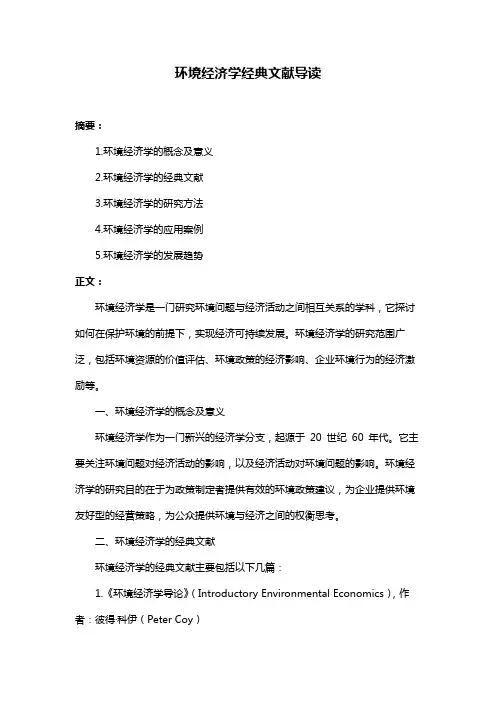
环境经济学经典文献导读摘要:1.环境经济学的概念及意义2.环境经济学的经典文献3.环境经济学的研究方法4.环境经济学的应用案例5.环境经济学的发展趋势正文:环境经济学是一门研究环境问题与经济活动之间相互关系的学科,它探讨如何在保护环境的前提下,实现经济可持续发展。
环境经济学的研究范围广泛,包括环境资源的价值评估、环境政策的经济影响、企业环境行为的经济激励等。
一、环境经济学的概念及意义环境经济学作为一门新兴的经济学分支,起源于20 世纪60 年代。
它主要关注环境问题对经济活动的影响,以及经济活动对环境问题的影响。
环境经济学的研究目的在于为政策制定者提供有效的环境政策建议,为企业提供环境友好型的经营策略,为公众提供环境与经济之间的权衡思考。
二、环境经济学的经典文献环境经济学的经典文献主要包括以下几篇:1.《环境经济学导论》(Introductory Environmental Economics),作者:彼得·科伊(Peter Coy)2.《环境资源配置与政策》(Environmental and Resource Economics),作者:丹尼尔·科曼(Daniel Kammen)3.《环境与经济》(Environment and Economy),作者:保罗·萨缪尔森(Paul A.Samuelson)4.《环境经济学手册》(Handbook of Environmental Economics),作者:罗杰·斯托(Roger Stowe)等。
这些经典文献为环境经济学的发展奠定了基础,并提供了许多有益的理论观点和实证研究。
三、环境经济学的研究方法环境经济学的研究方法主要包括以下几种:1.成本效益分析(Cost-Benefit Analysis):通过比较环境政策或环保措施的成本与效益,评估其经济合理性。
2.环境资源的价值评估(Valuation of Environmental Resources):通过对环境资源的价值进行评估,以便在政策制定过程中充分考虑环境因素。
资源与环境经济学相关学术期刊
4
自然资源学报
中国自然资源学会
/
5
资源科学
中国科学院主管、地理科学与资源研究所
/
6
中国环境科学
中国环境科学学会
/
7
环境科学学报
《资源与环境经济学》研究相关核心期刊
序号
刊名
主办与主管单位
网址
1
中国人口资源与环境
中国可持续发展研究会,中国21世纪议程管理中心,山东师范大学
/
2ቤተ መጻሕፍቲ ባይዱ
环境保护
中国环境科学出版社
/
3
环境经济
中国环境报社,环境保护部
中国科学院生态环境研究中心
/
8
农业环境科学学报
农业部主管、农业部环境保护科研监测所、中国农业生态环境保护协会主办
/
9
长江流域资源与环境
中国科学院资源环境科学与技术局与中国科学院武汉文献情报中心
/
资源与环境经济学论文参考文献范例
资源与环境经济学论文参考文献一、资源与环境经济学论文期刊参考文献[1].新的学术增长点:人口、资源与环境经济学——基于财富观演化视角的分析.《现代经济探讨》.被北京大学《中文核心期刊要目总览》收录PKU.被南京大学《核心期刊目录》收录CSSCI.2012年10期.王保忠.何炼成.李忠民.[2].人口、资源与环境经济学教材比较研究.《中国人口·资源与环境》.被中信所《中国科技期刊引证报告》收录ISTIC.被北京大学《中文核心期刊要目总览》收录PKU.被南京大学《核心期刊目录》收录CSSCI.2008年2期.谢双玉.许英杰.曾群.胡静.[3].地理学与人口、资源与环境经济学的协同创新——“中国人口、资源环境与经济社会协调发展高端论坛”纪要.《中国人口·资源与环境》.被中信所《中国科技期刊引证报告》收录ISTIC.被北京大学《中文核心期刊要目总览》收录PKU.被南京大学《核心期刊目录》收录CSSCI.2014年11期.张晓青.王志宝.[4].论人口、资源与环境经济学学科构架的理论基础.《人口与发展》.被北京大学《中文核心期刊要目总览》收录PKU.被南京大学《核心期刊目录》收录CSSCI.2010年2期.陈明立.[5].超越“经济人”论“人口、资源与环境经济学”的基本假设.《商业时代》.被北京大学《中文核心期刊要目总览》收录PKU.2014年25期.袁红辉.[6].经济学帝国主义与人口资源环境经济学学科发展.《中国人口·资源与环境》.被中信所《中国科技期刊引证报告》收录ISTIC.被北京大学《中文核心期刊要目总览》收录PKU.被南京大学《核心期刊目录》收录CSSCI.2007年5期.李通屏.邵红梅.邓宏兵.[7].人口、资源与环境经济学结构框架的生产视角分析.《现代财经-天津财经大学学报》.被北京大学《中文核心期刊要目总览》收录PKU.被南京大学《核心期刊目录》收录CSSCI.2008年8期.罗丽艳.[8].基于二元价值论的人口、资源与环境经济学概念框架.《人口与经济》.被北京大学《中文核心期刊要目总览》收录PKU.被南京大学《核心期刊目录》收录CSSCI.2008年3期.罗丽艳.[9].资源与环境经济学本科专业的核心课程设计探微基于美国91所高校类似专业的资料整理.《教学研究》.2015年3期.范巧.[10].采矿专业资源与环境经济学课程教学改革探索.《课程教育研究》.2015年28期.薛黎明.黄瑜.崔超群.二、资源与环境经济学论文参考文献学位论文类[1].准格尔旗产业转型研究.作者:孟士翔.理论经济学;人口、资源与环境经济学内蒙古师范大学2012(学位年度)[2].利用生态效率指标体系对青岛循环经济发展的评价与对策研究.作者:栾桂林.人口、资源与环境经济学青岛大学2009(学位年度)[3].煤炭清单与减排政策研究.被引次数:7作者:黄建.人口、资源和环境经济学复旦大学2011(学位年度)[4].碳排放权交易定价问题研究.被引次数:5作者:赵娜.人口、资源与环境经济学民族大学2011(学位年度)[5].赤峰市森林资源—环境—经济复合系统可持续发展动态评价及预警.被引次数:6作者:王雄.水土保持与荒漠化防治内蒙古农业大学2007(学位年度)[6].基于土地利用变化的生态系统服务价值评估——以乌尔禾区为例.被引次数:1作者:潘英.人口、资源与环境经济学新疆师范大学2012(学位年度)[7].基于生态经济观的总需求总供给分析——建设可持续发展的经济.作者:任群罗.人口、资源与环境经济学新疆大学2006(学位年度)[8].安徽省碳排放驱动因素分析.作者:焦玮.人口、资源与环境经济学安徽大学2013(学位年度)[9].城中村问题:形成、存续与改造的经济学分析.被引次数:82作者:周新宏.人口、资源与环境经济学复旦大学2007(学位年度)[10].我国环保产业区域发展研究.被引次数:8作者:张翠姣.人口、资源与环境经济学重庆大学2009(学位年度)三、资源与环境经济学论文专著参考文献[1]略论人口、资源与环境经济学学科构架的理论基础.陈明立,20082008年全国资源环境经济管理论坛[2]基于人口、资源与环境经济学基本理论的经济统计体系的思考.卢黎霞,20062006全国循环经济基础理论与发展模式学术研讨会[3]流域生态补偿意愿的WTP与WTA差异性研究基于辽河中游地区居民的CVM调查.徐大伟.刘春燕.常量,2012中国环境科学学会环境经济学分会2012年年会[4]试论如何推动海洋经济转型.刘腾飞.杨维,2013第十五届中国科协年会[5]基于环境经济学的湿地退化原因及保护措施.雷智鹚,2009第三届长江论坛[6]克服蚕食CDM机制资源租的信息成本问题:碳权交易所的信息功能. 陈伟青.黄颖利,2010第十二届中国科协年会[7]历史建筑估价方法的应用研究.徐进亮.张弘武,20142014年国际房地产评估论坛[8]现行征地补偿标准不合理性分析——基于资源环境经济学的分析视角. 王瑞雪,20072007年全国中青年农业经济学者年会[9]浅议解决水资源问题的经济途径.李洪波,2008宁波市第五届学术大会[10]区域经济资源环境协调发展的系统动力学研究——以江苏省为例.黄贤凤.王建华,2006中国可持续发展研究会2006学术年会。
《环境资源产业经济学》参考书目
环境资源产业经济学参考书目(部分)以下所列的参考文献是最低数量的必读文献。
导论环境资源产业经济学纲要(一)国内文献和书籍第一,授课规定教材:1.王天津著:《西部环境资源产业》,大连:东北财经大学出版社, 2002年。
2.王天津、赵海云著:《环境资源产业经济学原理和应用》,北京:中央民族大学出版社,2007年5月。
第二,国内部分参考文献:1.党的“十六”大报告中关于建设小康社会的第四个目标和与此相关的政策。
2.第十届全国人民代表大会第四次会议批准:《中华人民共和国经济和社会发展第十一个五年规划纲要》,北京:人民出版社,2006年。
3. 王天津:《青藏高原人口与环境承载力》,北京:中国藏学出版社,1998年。
4.王天津主编:《中国西部开发大百科》,北京:中国大百科全书出版社,2002年。
5.陈大夫:《资源环境经济学》,北京:地质出版社,2005年。
6. 杨云彦主编:《人口、资源与环境经济学》,北京:中国经济出版社,2004年。
7.王文长、李俊峰等:《西部特色经济》,北京:民族出版社,2002年。
8.刘国仁:《资源性资产评估》,北京:中国人民大学出版社,2003年。
9. 张凯:《循环经济理论研究与实践》,北京:中国环境科学出版社,2004年。
10.国家环境保护总局国际合作司等编:《联合国环境与可持续发展-系列大会重要文件选编》,北京:中国环境科学出版社,2004年。
11.曲富田:《资源经济学》,北京:中国农业出版社,2002年。
12.潘家华:《持续发展途径的经济分析》,北京:中国人民大学出版社,1997年。
13.左玉辉:《环境学》,北京:高等教育出版社,2003年。
14.钱易:《环境保护与可持续发展》,北京:高等教育出版社,2000年。
15.历以宁等:《环境经济学》,北京:中国计划出版社,1995年。
16.盛连喜:《环境生态学导论》,北京:高等教育出版社,2003年。
17.戴星冀、唐松江、马涛:《经济全球化与生态安全》,北京:科学出版社,2005年。
大一资源与环境经济学论文范文模板
大一资源与环境经济学论文范文模板引言资源与环境经济学是研究资源利用与环境保护之间相互作用的学科。
随着全球经济的发展,资源短缺和环境问题日益突出,资源与环境经济学愈发重要。
本文旨在探讨资源与环境经济学的相关问题,并提供一份大一资源与环境经济学论文范文模板,供同学们参考。
背景资源与环境是人类生存与发展的基础,但也面临着日益严峻的挑战。
全球资源消耗速度加快,环境污染问题加剧,已经成为制约经济可持续发展的重要因素。
因此,研究资源与环境经济学,提出有效的解决方案,具有重要的现实意义。
研究目的本研究旨在探讨资源与环境经济学的关键问题,包括资源配置、环境政策、可持续发展等,以及相关的经济学模型和方法。
通过对这些问题的研究,可以更好地理解资源与环境之间的关系,并提出可行的政策建议,为解决当前面临的资源与环境问题提供参考。
研究方法本研究采用文献综述的方法,收集与资源与环境经济学相关的经典文献,分析其中的理论模型、实证分析和政策建议,以全面了解研究领域的发展现状和前沿动态。
研究结果资源配置问题资源配置是资源与环境经济学中的核心问题之一。
有效的资源配置可以提高资源利用效率,实现资源的可持续利用。
研究表明,市场机制可以在一定程度上实现资源的有效配置,但也存在信息不对称和外部性等问题。
因此,政府在资源配置中的作用不可或缺。
环境政策问题环境政策是保护环境、实现可持续发展的重要手段。
经济学提供了一系列工具和方法,用于研究环境政策的制定和实施。
例如,碳税、排污权交易等经济政策可以通过经济激励机制调整环境行为,实现环境效益的最大化。
可持续发展问题可持续发展是资源与环境经济学的终极目标。
在经济增长的同时,如何保护环境、实现社会公平是一个重要的挑战。
研究表明,可持续发展需要协调经济发展、社会公平和环境保护的关系,提出合理的发展路径和政策。
结论资源与环境经济学是当前研究的热点领域,通过对资源与环境之间关系的研究,可以为解决资源短缺和环境问题提供理论和实践指导。
- 1、下载文档前请自行甄别文档内容的完整性,平台不提供额外的编辑、内容补充、找答案等附加服务。
- 2、"仅部分预览"的文档,不可在线预览部分如存在完整性等问题,可反馈申请退款(可完整预览的文档不适用该条件!)。
- 3、如文档侵犯您的权益,请联系客服反馈,我们会尽快为您处理(人工客服工作时间:9:00-18:30)。
《资源与环境经济学》经典文献P igou, A. C., Economics of Welfare, London: Macmillan,1920William J. Baumol and Wallace E. Oates, The Theory of Environmental Policy, University of Chicago Press, 1988(中高级水平)Xepapadeas, A., Advanced Principles in Environmental Policy, Edward Elgar, 1997(中高级水平)A.M. Freeman, The Measurement of Environmental and Resource Values: Theory and Methods, 2nd edition, Resources For Future, 2003Maler, Karl-Goran and Jeffrey Vincent, Handbook of Environmental Economics, Vol1,2,3, North-Holland, 2003(vol 1), 2005(vol 2and 3)T. Haab and T.E. McConnell, Valuing Environmental and Natural Resources: The Econometrics of Non-market Valuation, Edward Elgar Publishers, 2002Stavins, Robert, eds. Economics of the Environment: Selected Readings, 5th edition 2005埃莉诺·奥斯特罗姆,公共事物的治理之道——集体行动制度的演进,上海三联书店,2000沈满洪,环境经济手段研究,中国环境科学出版社,2001王亚华,水权解释,上海三联书店,2005沈满洪,水权交易制度研究——中国的案例分析,浙江大学出版社,2006Harold Hotelling, The Economics of Exhaustible Resources, Journal of Political Economics, 39,2, 137-75,1931Meade,J. Externial Economics and Diseconomies in a Competitive Situation,Economic Journal, Vol.62,PP54-67, 1952Coase, Ronald, The Problem of Social Cost, Journal of Law and Economics, 3, 1-44, 1960Buchanan, J. and W. Stubblebine, Externality, Economica, 371-384, 1962 Baumol, W.J., On Taxation and the Control of Externalities, America Economic Review, PP.307-321, 1972Demsetz,H., Toward a Theory of Property Rights, American Economic Review,Vol.57, PP.347-359,May 1967Garrett Hardin,The Tragedy of the Commons, Science, Vol. 162, PP1243-1248,Dec.13, 1968Steven Kelman, "Cost Benefit Analysis: An Ethical Critique" (1981)James V. Delong, Robert M. Solow, Gereard Butters, John Calfee, and Pauline Ippolito, "Defending Cost-Benefit Analysis: Replies to Steven Kelman" (1981)Robert W. Haln, Economics Prescriptions for Environmental Problems: How the Patient Followed the Doctor’s Orders, Journal of Economic Perspectives, 3(2):95-114, 1989Tom Tietenberg, "Economic Instruments for Environmental Regulation" (1990) William D. Nordhaus, To Slow or Not Slow: The Economics of the Greenhouse Effect, Economic Journal, 101, 920-37, 1991Robert M. Solow, "Sustainability: An Economist’s Perspective" (1992)Maureen L. Croper and Wallace E. Oates, Environmental Economics: A Survey, Journal of Economic Literature, 30:675-740, 1992V. Kerry Smith, Nonmarket Valuation of Environmental Resources: An Interpretive Appraisal, Land Economics, 69(1):1-26,1993William D. Nordhaus, "Reflections on the Economics of Climate Change" (1993) Paul R. Portney, "The Contingent Valuation Debate: Why Economists Should Care" (1994)W. Michael Hanemann "Valuing the Environment through Contingent Valuation" (1994)Peter A. Diamond and Jerry A. Hausman, "Contingent Valuation: Is Some Number Better than No Number?" (1994)Adam B. Jaffe, Steven R. Peterson, Paul R. Portney, and Robert N. Stavins, "Environmental Regulation and the Competitiveness of U.S. Manufacturing: What Does the Evidence Tells Us?" (1995)Michael E. Porter and Claas van der Linde, "Toward a New Conception of the Environment-Competitiveness Relationship" (1995)Karen Palmer, Wallace E. Oates, and Paul R. Portney. "Tightening Environmental Standards: The Benefit-Cost or the No-Cost Paradigm?" (1995)W. Michael Hanemann, Contingent Valuation and Economics, Environmental Valuation: New Perspectives, 79-117, 1995W. Kip Viscusi, Regulating the Regulators, University of Chicago Law Review, 63:1423-1461, 1996Kenneth J. Arrow, Maureen Cropper, George C. Eads, Robert W. Hahn, Lester B. Lave, Roger G. Noll, Paul R. Portney, Milton Russell, Richard Schmalensee, V. Kerry Smith, and Robert N. Stavins, "Is There a Role for Benefit-Cost Analysis in Environmental, Health, and Safety Regulation?" (1996)R. Costanza, R. d'Arge, R. de Groot, S. Farber, M. Grasso, B. Hannon, S. Naeem, K. Limburg, J. Paruelo, R.V. O'Neill, R. Raskin, P. Sutton and M. van den Belt, The value of the world's ecosystem services and natural capital, Nature387, pp. 253–260, 1997Michael J. Sandel, "It’s Immoral to Buy the Right to Pollut e" 1997Thomas C. Schelling, "The Cost of Combating Global Warming" (1998)Henry D. Jacoby, Ronald Prinn, and Richard Schmalensee, "Kyoto’s Unfinished Business," Foreign Affairs 77, July/August, 1998: pp. 54-66.Gardner M. Brown and Jason F. Shogren, "Economics of the Endangered Species Act," Journal of Economic Perspectives 12 (1998): 3-20.Andrew Metrick and Martin L. Weitzman, "Conflicts and Choices in Biodiversity Preservation" (1998)Nathaniel O. Keohane, Richard L. Revesz, and Robert N. Stavins, "The Choice of Regulatory Instruments in Environmental Policy" (1998)Richard Schmalense, Pau L. Joskow, A. Denny Ellerman, Juan Pablo Montero and Elizabeth M. Bailey, An Interim Evaluation of Sulfur Dioxide Emissions Trading, Journal of Economic Perspectives, 12(3):53-68, 1998Robert N Stavins, What Can We Learn from the Grand Policy Experiment? Lessons from SO2 Allowance Trading, Journal of Economic Perspectives, 12(3):69-88, 1998 R. David Simpson, Economic Analysis and Ecosystems: Some Concepts and Issues, Ecological Applications, (2)342-349,1998Paul L. Joskow and Richard Schmalense, The Political Economy of Market-Based Environmental Policy: The U.S. Acid Rain Program, Journal of Law and Economics, 41:37-83, 1998Jason F. Shogren, A Political Economy in an Ecological Web, Environmental and Resource Economics, 11(3-4):557-570, 1998Robert W. Hahn, "The Impact of Economics on Environmental Policy," Journal of Environmental Economics and Management 39 (2000): 375-399.W. Kip Viscusi, "The Value of Life in Legal Contexts: Survey and Critique," American Law and Economics Review 2 (2000): 195-222.Warwick J. McKibbin, and Peter J. Wilcoxen, "The Role of Economics in Climate Change Policy," Journal of Economic Perspectives 16 (2002): 107-129.Lawrence H. Goulder and Robert N. Stavins, "An Eye on the Future," Nature 419 (2002): 673-74.A. Myrick Freeman, "Environmental Policy Since Earth Day I: What Have We Gained?" Journal of Economic Perspectives 16 (2002): 125-46.Susmita Dasgupta, Denoit Laplante, Hua Wang, and David Wheeler, "Confronting the Environmental Kuznets Curve," Journal of Economic Perspectives 16 (2002): 147-68.Scott Barrett, "Creating Incentives for International Cooperation: Strategic Choices," in I. Kaul, P. ConceiÁ“o, K. Le Goulven, and R. U. Mendoza (eds.), Providing Global Public Goods: Managing Globalization (New York: Oxford University Press, 2002, pp. 308-28).Richard T. Carson, Robert C. Mitchell, Michael Hanemann, Raymond J. Kopp, Stanley Presser, and Paul A. Ruud, "Contingent Valuation and Lost Passive Use: Damages from the Exxon Valdez Oil Spill," Environmental and Resource Economics 25 (2003): 257-86.Robert W. Hahn, Sheila M. Olmstead, and Robert N. Stavins, "Environmental Regulation in the 1990s: A Retrospective Analysis," Harvard Environmental Law Review 27 (2003): 377-415.Jeffrey A. Frankel, "The Environment and Globalization," forthcoming in Globalization: What’s New, edited by Michael Weinstein (Council on Foreign Relations, 2004).。
